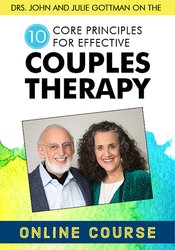How to Hold Hope When Couples Feel Hopeless

When couples enter therapy on the brink of collapse—resentful, shut down, barely speaking—it’s easy for therapists to feel what the couple feels: hopelessness.
But as Drs. John and Julie Gottman remind us in the powerful final chapter of their book, 10 Principles for Doing Effective Couples Therapy, your most important role in these moments may not be delivering the perfect intervention or resolving every conflict. It’s this: Hold the hope.
Why Hope Matters in Couples Therapy
Only a small percentage of couples in serious distress ever make it to therapy. Those who do are often at their lowest point, emotionally exhausted and out of ideas. But the very act of walking into your office is a signal, however faint, that they want something to be different. And that small flicker of willingness is where your hope begins.
As therapists, we have the privilege of seeing something they can’t yet see: their resilience, their strength, and their capacity to heal even from deep betrayal or decades of disconnect. Hope is not a denial of pain. It’s an insistence that transformation is still possible.
The Therapist’s Inner Work: Holding Steady in the Storm
There is an emotional toll couples work can take on the therapist. When you’re working with high-conflict or trauma-burdened couples, especially early in your career, it’s easy to internalize the despair in the room. This is why the chapter centers not on another intervention technique, but on you—the therapist’s internal world.
You are asked to anchor yourself in the belief that humans are capable of extraordinary growth. Even couples who’ve experienced something as extreme as 57 affairs can still recover, if they’re willing to do the work and you’re willing to guide them with courage and compassion.
5 Practical Ways to Instill Hope When Couples Feel Hopeless
The Gottmans offer several strategies for therapists to embed hope throughout the therapeutic process:
1. Start with Strengths
Even in the assessment phase, look for glimmers of positivity. A fond memory, even if buried under years of resentment, is a seed. Highlight it. Let the couple hear you say, “That’s something we can build on.”
2. Normalize the Struggle
Many couples have never been taught how to navigate conflict or connection. Frame their challenges as issues of skill—not character. “Where would you have learned this?” can be a liberating question.
3. Celebrate Small Wins
When a partner shows empathy, shifts their tone, or manages a tough conversation differently—even once—call it out. “Good job. You really can do this.” These affirmations become the couple’s new internal dialogue.
4. Model Fondness and Admiration
By identifying and affirming their efforts in session, you’re not only instilling hope, but you’re also showing them how to see the good in each other again.
5. Use Concrete Visual Tools
John Gottman describes using a whiteboard to list and then “erase” regrettable incidents as couples work through them. This visible act reinforces that the past doesn’t have to dictate the future.
What to Do When Hope Isn’t Enough in Couples Therapy
Sometimes, despite every intervention and all your holding of hope, a couple may still choose to part ways. In those moments, your role shifts from savior to witness. After all, therapy is not about fixing every marriage. It’s about honoring each person’s path. Sometimes the greatest gift you offer is compassionate acceptance of what is.
And still, hope plays a role. Because even if the relationship ends, your support may help each partner walk away with more clarity, self-understanding, and capacity for future connection.
Bringing Hope into the Therapy Room and its Ethical Stance
Holding hope isn’t about blind optimism. It’s a grounded, evidence-informed belief in the possibility of change. It's about reflecting back to couples a version of themselves they may have forgotten—one where healing is possible, connection is repairable, and love can be rebuilt.
So when a couple says, “We don’t think we can make it,” you might gently respond, “You’re not in a lawyer’s office. You’re here. And that means something.”
In the words of the Gottmans: Be the one who holds the hope.

Drs. John and Julie Gottman on the 10 Core Principles for Effective Couples Therapy






